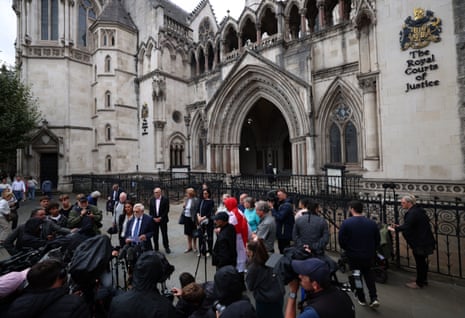Leader of Epping Forest council calls for calm after court of appeal ruling
The leader of Epping Forest district council has called for calm after the court of appeal ruled asylum seekers can stay at the Bell hotel in Essex.
Councillor Chris Whitbread told Times Radio:
I call for calm. There’s been peaceful protests and there’s been non peaceful protests outside the hotel.
He added:
We saw yesterday the government say that asylum seekers have more rights than my residents. I’m really cross with this ruling. Obviously we’ll now reflect on where we are.
Obviously we’re still going to court in October to go for a final injunction and we will be pushing hard to make sure that’s successful, but we will do everything we can still.
This is an awful position for the town … I’m really concerned for the future of the town at the moment.

Speaking outside the London court after the ruling, Ken Williamson, member of cabinet for Epping Forest district council said:
We understand government faces a dilemma, but that should not be at the expense of local communities.
Planning law may seem dull, it might seem boring, but it goes to the heart of the relationship between local communities and good government. It enshrines the rights of local people to have a say within their own communities, and it should not be set aside lightly. The government can still listen.
It needs to understand and take responsibility for the events that have taken place in Epping over the past six weeks, for the trauma and disruption brought upon our community.
The council could still be granted an injunction after a full hearing of the legal claim, which is due to be heard in October.
Key events
In nearby Cheshunt, Hertfordshire, a video posted on YouTube showed dozens of protesters behind barriers near the Delta Marriott hotel, which has also been used to house asylum seekers.
Police stood in front of the barriers and some roads were closed with counter-protesters from Stand Up To Racism also in attendance.
At one point, protesters appeared to clash with officers.
MSP denies placing secret camera in Scottish Parliament toilets
Away from the ruling for a moment, suspended Labour MSP Colin Smyth has denied allegations that he placed a secret camera in toilets inside the Scottish Parliament.
The Press Association understands that Smyth has been charged by the police in relation to the allegation, which was first reported in the Daily Record.
The South Scotland MSP was arrested on 5 August and charged with a separate offence of possession of indecent images, prompting his suspension from Scottish Labour.
His Holyrood pass was deactivated on Thursday.
On Friday, Smyth said he was “fully co-operating” with the investigation but said the decision by the police to release further information and his home address had been “devastating”.
He said:
This allegation has come as an utter shock and one I strongly refute.
For legal reasons, I can’t respond to specific matters or speculation, and I appreciate there is a process to go through which I am, of course, fully co-operating with. But I sincerely hope it can be concluded quickly and fairly.
The speculation, and the recent decision by the police to publicly release details of their ongoing inquiries along with my home address has been devastating and has taken a serious toll on my health.
After my address was published with no warning to my family, I felt I had no choice but to move away to protect them. That has also meant losing the local NHS critical support I had been receiving for the past few weeks, making an already difficult time even more distressing.
I would therefore ask that the privacy of myself, but above all my family and friends, is respected while this matter is resolved. Having this hanging over them is especially overwhelming.
Responding to the ruling, Steve Smith, chief executive of refugee charity Care4Calais, told the BBC it “made it clear that violent protest, and in many cases overt racism, is not a fast-track route for the far right to attack the rights of people seeking sanctuary in this country”.
Liberal Democrat home affairs spokeswoman, Lisa Smart, told the broadcaster that Labour should be “speeding up asylum processing to bring down the backlog and end hotel use once and for all”.
And border security and asylum minister Dame Angela Eagle said the government “will stop using hotels, which aren’t a sustainable solution, by the end of this parliament”.
“This judgement assists us by allowing us to do that in a planned and orderly fashion,” she said.
“We all want the same thing,” she added, “which is to get out of asylum hotels”.
Analysis: Labour won the legal battle over asylum hotels, but the right is running the story

Aletha Adu
Protesters were already gathering outside the Bell hotel by Friday evening with St George and union flags waving. This court ruling was never going to end as a quiet legal moment.
For the Home Office, the court of appeal’s decision was a practical win. If the ruling had gone the other way the government would have been forced to rehouse 138 asylum seekers in a matter of days, opening the floodgates to similar legal challenges from other councils. Since there is scant alternative accommodation available, this ruling buys the government time.
Government insiders say that by the end of the year they expect at least five more hotels housing asylum seekers to close, with more to follow in the new year. If the closures proceed, the ruling means they still have time to deliver their promise of shutting all the hotels down “in a controlled and orderly way” by 2029.
But political tensions have, of course, been reignited. Nigel Farage immediately jumped on the moment, accusing the government of “using the law against the people of Epping”. He said “illegal migrants now have more rights than the people of Essex” and promised Reform UK would “put an end to this”. This is the kind of high-emotion, high-visibility moment Farage thrives on and a story that plays into his hands.
Richard Tice, the deputy leader of Reform UK, also piled in, telling supporters on X: “Judges side with illegal migrants against British people. ECHR used by judges to overrule planning law, democratic protests and the safety of Epping residents.”
The government remains stuck in the same political fight – trying to stave off challenges from the right while at the same time getting on with the job of ensuring there is a functioning political project that can communicate its wins.
Angela Eagle, the border security and asylum minister, said: “Nobody wants to close the Bell hotel and all other asylum hotels more than me.”
She reiterated the government’s pledge to do this by 2029.
Asked what her message is for those who say the fight’s not over, she responded: “I think we all want the same thing – which is to get out of asylum hotels.”
Eagle added: “We’ve said they’re not sustainable and we’ve inherited a system with huge backlogs,” the BBC reported.

Comment ×